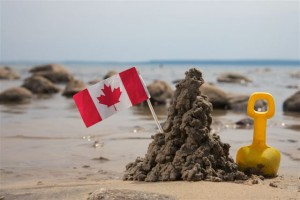By Blaze
Finally, I’m posting a synopsis of Solving the Problem of US Citizenship information session presented by John Richardson of citizenshipsolutions.ca that was held in London, Ontario on February 8, 2014.
I apologize for the delay. Other FATCA projects have consumed my life.
You can read the synopsis in the link, but here are a few highlights:
CITIZENSHIP:
John first gave an overview of US citizenship laws, tax laws, renunciation and relinquishment and many changes that have taken place over decades.
People have many differing circumstances and each one is unique. Because of the complexities, John stressed:
“The bottom line is you have to check the law at the time the act took place.”
For people born in Canada to one or more parent born in the U.S., John suggested they should not automatically assume they are US citizens or US persons. There are many different rules around that. In addition John questions whether the US can apply their laws on people born outside of U.S. So, he recommended people explore that before making an assumption they must be a US citizen.
He said:
“I would never, never, never under any circumstances advise someone to simply swallow hook line and sinker, well my father was American, therefore I am American for a number of reasons.:
A Supreme Court decision from the 1960s dealt with the forcible destruction of US citizenship. John confirmed many in the room felt they were being forced to relinquish US citizenship.
John believes:
The forcible destruction of US citizenship is going to become THE argument on this issue.
John explained renunciation is one form of relinquishment, along with other expatriating acts like becoming a citizen of another country with the intent of relinquishing US citizenship, working for a foreign government and other actions.
For numerous reasons, John recommended people who are renouncing or relinquishing by other means should get a Certificate of Loss of Nationality (CLN) through US Department of State by renouncing or reporting relinquishing at a US Consulate.
John reported there are various reasons to
“Deal with this sooner, rather than later.”
For many different reasons, John thinks:
“U.S. citizenship is probably the most dangerous, toxic citizenship in the world today.”
Lynne advised people who became naturalized Canadian citizens may be able to get information from their Canadian citizenship file by applying through Access to Information at (http://www.cic.gc.ca/english/department/atip/form-imm5563.asp)
PERSONAL EFFECTS:
John recognized the toll these issues are taking on people. He stressed:
“Your life, your health, your family is so, so much important than any of this stuff. If you focus on this in a way that jeopardizes the things that make life worthwhile, you’re going to let these people win–absolutely destroy your life.”
TAXES:
John said there are two types of US persons:
1. Those Who Are Compliant
2. Those Who Are Not Compliant
No matter what, you’re going to have a problem. “When we talk about U.S. taxes, we’re talking about much more than taxes. It’s a whole information reporting regime, which is a huge problem.”
He covered many of the issues relating to taxation, but said the most important message was:
“One thing you should absolutely not do is enter the Offshore Voluntary Disclosure Program” (OVDP).
CANADA REVENUE AGENCY, CANADIAN COURTS:
John explained that under the Canada-US Tax Treaty, CRA will not collect penalties for the IRS for Canadian citizens or residents. CRA also will not collect taxes for the IRS on a US citizen who also was a Canadian citizen at the time the tax liability arose.
Plus, under the Revenue Rule, Canadian courts will not issue a judgement for the IRS.
FATCA:
John thinks FATCA is a “gross abuse of power” by the United States.
“FATCA allows them to redefine any time they want what the information is and any person who is affected.”
Lynne noted the proposed legislation to allow FATCA to be implemented will prevail over other federal laws, including banking, privacy and human rights laws. Some individuals have contacted a constitutional lawyer about this and more information will be posted at Maple Sandbox (maplesandbox.ca and Isaac Brock Society (isaacbrocksociety.ca)
UPDATE: Money was raised and constitutional lawyer Joseph Arvay was retained on March 10 by Dr. Stephen Kish and Lynne Swanson to provide a legal opinion on a possible challenge to the FATCA IGA enabling legislation under the constitution and Charter of Rights and Freedoms.
Cross-posted with permission from Maple Sandbox






Offthread, but cannot post to main site. If someone wants to pick this up, it’s frustrating and perhaps important if it passes. There is legislation to stop double taxation at last:
http://www.telcoa.org/legislation/multi-state-worker-tax-fairness-act/
Americans onshore are so lucky to have representation.
Pingback: Once upon a time, before #FATCA people wanted US citizenship | Citizenship Counselling For U.S. Citizens in Canada and Abroad